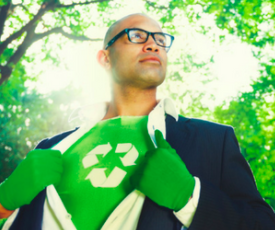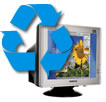 Tired of how inconvenient it can be to recycle your computer, cell phone, laptop, MP3 player or PDA?
Tired of how inconvenient it can be to recycle your computer, cell phone, laptop, MP3 player or PDA?
A new ECycling Leadership Initiative will make it easier for you to find more than 5,000 recycling locations around the country so you can keep your e-waste out of the trash.
Consumer electronics industry leaders have launched this first-ever industry-wide electronics recycling initiative with an ambitious goal: To recycle one billion pounds of electronics annually by 2016, which would be a more than threefold increase over 2010. One billion pounds of electronics, if not properly recycled, would completely fill the equivalent of a 71,000-seat NFL stadium. (The picture to the left shows a mountain of electronic keyboards in need of recycling.)
E-waste is the fastest growing element of the waste stream, so recycling electronics rather than throw them away must be done. Electronic equipment contains many heavy metals that are better captured than left to get loose in landfills or trash heaps, where they can contaminate groundwater and soil. Plus, given how much energy, water and other resources it takes to make a computer or a phone, it’s much more environmentally friendly to recapture and reuse those materials than tp throw them away.
“The billion pound challenge is about both the quality and quantity of electronics recycling,” said Walter Alcorn, CEA’s vice president of environmental affairs and industry sustainability, in a company press release. “But we won’t stop at a billion pounds. The eCycling Leadership initiative is an ongoing, permanent initiative that will … prohibit the use of recyclers and downstream processors who dump end-of-life electronics in developing nations.”
To that end, CEA supports certifying third-party recyclers to verify that the electronics are, in fact, being recycled rather than trashed when they’re out of sight. In the future, look for new mobile apps to help make recycling computers and other electronics as easy as buying new ones. The eCycling Leadership Initiative will also bolster the number of collection sites by working with state and local governments and charities to make more e-cycling sites available.
NO NEED TO WAIT! GET STARTED RECYCLING ELECTRONICS NOW
Best Buy – I regularly recycle my electronics at Best Buy. Here’s their policy: “We’ll take just about anything electronic, including TVs, DVD players, computer monitors, cell phones and more. You can bring in up to two items a day, per household, and most things are absolutely free. However, there is a $10 charge for TVs 32″ and under, CRTs, monitors and laptops — but we’ll give you a $10 Best Buy gift card to offset that cost.” Along with an in-store drop off program and kiosks, Best Buy also offers a TV haul-away service when a new product is delivered, and a Tech Trade-In program compensating consumers with gift cards for valuable products. In early 2011, Best Buy stores nationwide collected nearly 400 pounds each minute for recycling.
Goodwill – Businesses and consumers can donate computers to Goodwill for recycling. Check with your local Goodwill office before dropping equipment off.
EBay.com, CraigsList.com, and FreeCycle.org – These sites also enable you to sell, trade or donate your computer rather than toss it in the trash.
Earth911.com enables you to find more local computer recycling locations. Just go to their website, plug in your zip code, and you’ll find electronics recyclers nearest your home or office.
WHAT ARE COMPANIES ALREADY DOING?
Apple
All e-waste collected by Apple programs worldwide is processed in the region where it was collected. The company says nothing is shipped overseas for recycling or disposal. Apple has instituted recycling programs in cities and college campuses in 95 percent of the countries where its products are sold, diverting more than 130.2 million pounds of equipment from landfills since 1994. Apple also takes back Apple computers, iPods, iPads and iPhones at no charge.
Dell
A partnership between Dell and Goodwill Industries International lets consumers drop off any used computers for no-cost recycling, whether they’re Dell brand or not. Donated equipment meeting Reconnect’s criteria are resold, and devices needing repair are either refurbished or broken down into parts to be recycled by Dell partners. The program supports Goodwill’s job training programs, employment placement services and other community-based programs for people who have disabilities, lack education or job experience, or face other challenges to finding employment.
HP
HP currently operates recycling services in 56 countries or territories worldwide. In the United States they launched a buyback program in January 2009 that includes free recycling if an HP- or Compaq-branded system has no value for consumers. HP recycled more than 200 million pounds of hardware globally in 2009, resulting in an estimated 210,000 tons of avoided carbon dioxide equivalent (CO2e) emissions. Since 1987, HP has recovered over 2 billion pounds of electronic product (for recovery and recycling) and HP print cartridges (for recycling).
LG
LG’s recycling program lets consumers drop off unwanted electronics at a Waste Management designated eCycling Center, or other alternative methods may be available. LG has recycled more than 7 million pounds since 2009, of which 3.3 million pounds were through LG’s voluntary program.
Nintendo of America
Because video game systems and games retain their value for many years beyond their retail lifecycle, Nintendo of America offers a number of customer support options to maximize their continued use, while also offering a free courtesy Take-Back Program to minimize the waste disposal of its products. The Take-Back Program provides for recycling of Nintendo hardware, software, accessories, and rechargeable batteries.
Panasonic, Sharp and Toshiba (Electronic Manufacturers Recycling Management Company, LLC)
Among other things, the Electronic Manufacturers Recycling Management Company, LLC (MRM) operates a voluntary nationwide collection and recycling service for brands produced by Panasonic, Sharp, Toshiba, Mitsubishi and Vizio. Since October 2007 MRM has established 840 collection sites across the U.S. and recycled more than 78 million pounds of electronics.
Samsung
Launched in the fall of 2008, Samsung Recycling Direct[SM] offers drop off locations in all 50 states. Samsung holds its recyclers accountable for environmentally responsible recycling, including no landfill, incineration, or export to developing countries of hazardous electronic wastes as commonly defined. Last year, in 2010, Samsung recycled over 50 million pounds of e-waste across the U.S., most of which was done voluntarily.
Sony
The Sony Take Back Recycling Program was the first national recycling initiative to involve both a major electronics manufacturer and a national waste management company. Since its inception in 2007, Sony has established a goal of collecting a pound of electronics for every pound it produces. To date Sony has collected and recycled more than 43 million pounds of electronics.
The eCycling Leadership Initiative is a collaboration among consumer electronics manufacturers, retailers, collectors, recyclers, non-governmental organizations and governments at all levels, and is coordinated by the Consumer Electronics Association.
You can find more information on the eCycling Leadership Initiative here.















14 thoughts on “Recycling Electronics Just Got Easier”
It’s now the law here in Vermont 😉
You can read more about the “rules” on our local newspaper site at: http://bit.ly/h5CTU1
Thanks for the resources. I have a hard enough time (in my medium sized town) finding places to recycle paper, plastic and glass! This is important stuff. I appreciate the post.
Glad to hear about Vermont! I hope the rest of the states follow suit.
We recycle/reuse every piece of packing paper and all cardboard boxes from our moving company. It’s amazing how many time a box can be reused, then re-purposed for crating glass table tops, mirrors, etc.
If you have an old and unused mobile phone or any kind of gadgets recycling is simply the right thing to do. Mobile phones and these gadgets contains some non biodegradable elements that may be harmful for us so rather than keeping your old phone and gadgets recycling it is a much better idea.
Great information and an easy read. I’m looking forward to using what i’ve learned.
Keep the great info comming.
Thanks
When there was a time that it was difficult to properly dispose of old computer hard drives and cell phone, people just throw in trash cans or keep them stored in cabinets which is not eco-friendly. These days, more recycling campaigns are visible and now we can get rid of old or broken cell phones and computers.
This is good news! As computers and cell phones keep on upgrading, we don’t have to worry about the e-waste being dumped on eco places. What a great way to help Mother Nature.
What great news! I’m glad there are environmental services who takes care of these e-waste. We don’t have to worry about obsolete gadgets anymore.
We should all go and recycle.Go green
We all know what’s happening to our Mother earth right now, and it’s not too late to make some actions like this, recycling your computer parts is a must! since our world now is engaging technology and with the name tech, for sure many natural minerals is needed to make such technology. So, I’m in favor of Recycling your computer.
After reading this article I can say that it is really a knowledgeable post. I found this page on yahoo. Thanks for sharing
Very good information to know. Recycling of old, unused or broken electronics is really a good move saving earth from e-waste. We (https://www.laptoplobster.com/) are also a UK based firm, which believe in recycling e-waste. That’s why we provide laptop recycling services to our customers where we buy your old,unused even broken laptops in whatever the conditions it is and also pay a good bucks for it.
Thanks so much for letting us know about your company. I hope people will take advantage of your services.